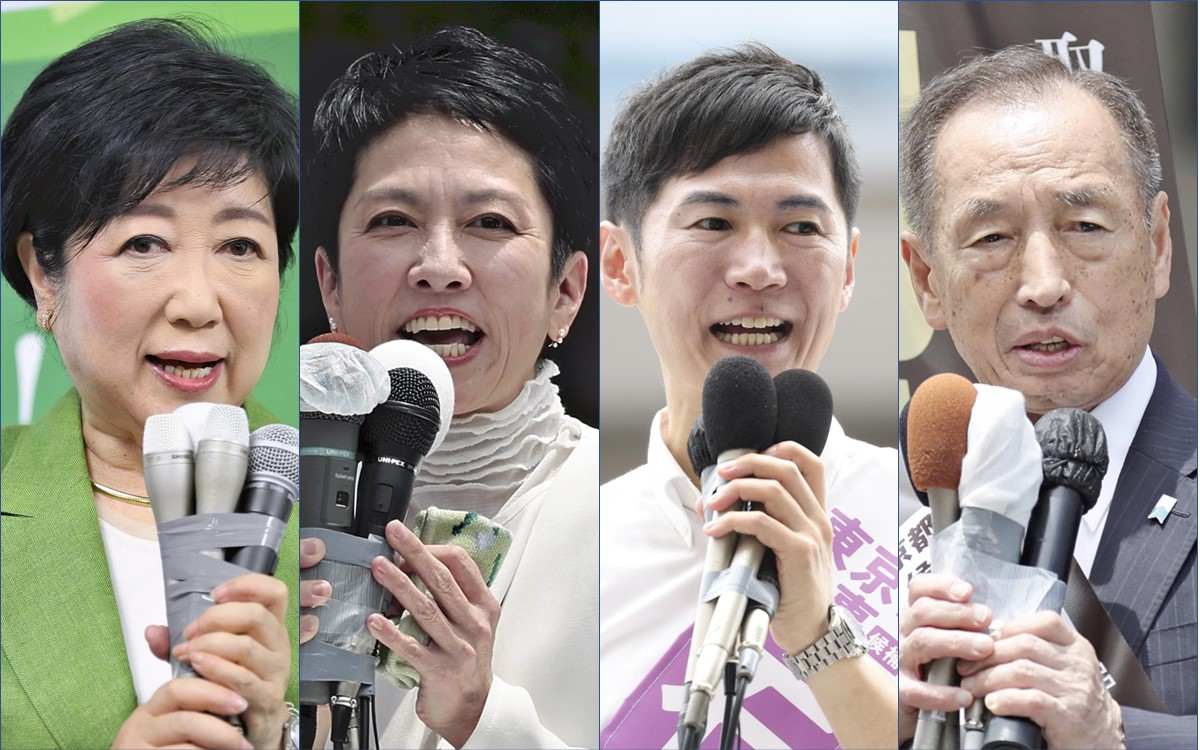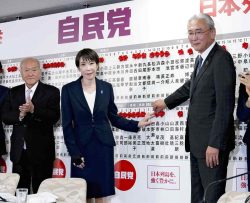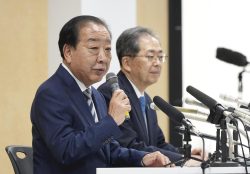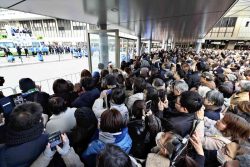Record 56 Candidates Run in Tokyo Gubernatorial Election; Showdown Between Renho, Koike Expected

From left, Yuriko Koike, Renho, Shinji Ishimaru, Toshio Tamogami
17:55 JST, June 20, 2024
The 17-day campaign to elect the next governor of Tokyo kicked off on Thursday.
The election is expected to evaluate the two-term, eight-year administration of incumbent Gov. Yuriko Koike as well as the candidates’ policies on a decreasing birthrate and preparations for earthquakes and wind and flood damage that could affect the metropolis. Votes will be cast and counted on July 7.
A record 56 have registered as candidates for the upcoming race, surpassing the previous record of 22 in the 2020 election.
Those who have submitted candidacy registrations include Koike, 71; former House of Councillors member Renho, 56; former Akitakata Mayor Shinji Ishimaru, 41; and former Air Self-Defense Force Chief of Staff Toshio Tamogami, 75. Renho lost her position as an upper house lawmaker upon seeking candidacy.
The Liberal Democratic Party, Komeito, the Democratic Party for the People and Tomin First no Kai (Tokyoites first group) — a regional party to which Koike serves as a special adviser — will support Koike. The Constitutional Democratic Party of Japan and the Japanese Communist Party will support Renho. The Japan Innovation Party has decided not to field a candidate. The campaign is expected to center on the battle between Koike and Renho, which is seen as a de facto showdown between the ruling and opposition parties.
Koike did not take to the streets on Thursday, instead prioritizing her official duties. She held a kickoff ceremony at her campaign office in Shinjuku Ward, where she said in front of supporters, “I have been working with all my strength and all my heart to protect the lives and livelihood of the people of Tokyo.
“Our slogan is ‘Protecting the capital.’ We will protect lives, livelihoods and economy, and make Tokyo the best city in the world,” she added.
Renho made her first speech in front of JR Nakano Station in Nakano Ward. Her speech was delayed by more than 30 minutes as it took time to register her candidacy.
Renho began by emphasizing that increasing the incomes of young people would lead to combating the declining birthrate.
“I want to eliminate the anxiety of young people and make Tokyo a comfortable place to live. This is a measure against the declining birthrate that only I can take,” she said.
Ishimaru made his first speech in front of his office in Shinjuku Ward. Putting the rehabilitation of politics as his primary policy, he criticized the current state of politics.
“Looking around at politics, I feel a lack of kindness. Being a politician [and not a statesman] is not good,” Ishimaru said. “Think about what you wish for and what you want to choose. Let us move together.”
In the Tsukiji district in Chuo Ward, Tamogami prioritized measures against disasters.
“I want to rebuild Japan from Tokyo and make it a safe and prosperous place to live,” Tamogami said. “I want people to look not at the merits of manifestoes but their feasibility. My experience as a member of the Self-Defense Forces gives me the ability to get things done.”
According to the Tokyo Metropolitan Government Election Administration Commission, there were 11,533,132 registered voters on the electoral roll as of Wednesday, up 64,194 from the previous election.
Top Articles in Politics
-

Japan PM Takaichi’s Cabinet Resigns en Masse
-

Sanae Takaichi Elected Prime Minister of Japan; Keeps All Cabinet Appointees from Previous Term
-

Japan’s Govt to Submit Road Map for Growth Strategy in March, PM Takaichi to Announce in Upcoming Policy Speech
-

LDP Wins Historic Landslide Victory
-

LDP Wins Landslide Victory, Secures Single-party Majority; Ruling Coalition with JIP Poised to Secure Over 300 seats (UPDATE 1)
JN ACCESS RANKING
-

Japan PM Takaichi’s Cabinet Resigns en Masse
-

Japan Institute to Use Domestic Commercial Optical Lattice Clock to Set Japan Standard Time
-

Israeli Ambassador to Japan Speaks about Japan’s Role in the Reconstruction of Gaza
-

Man Infected with Measles Reportedly Dined at Restaurant in Tokyo Station
-

Videos Plagiarized, Reposted with False Subtitles Claiming ‘Ryukyu Belongs to China’; Anti-China False Information Also Posted in Japan























